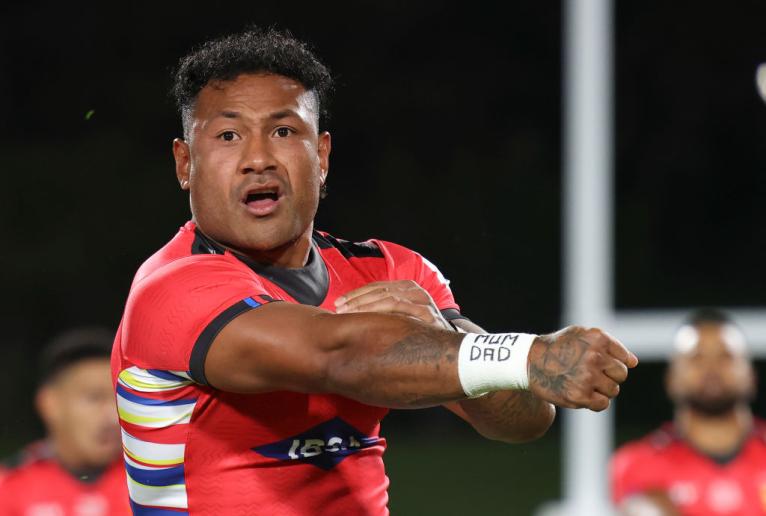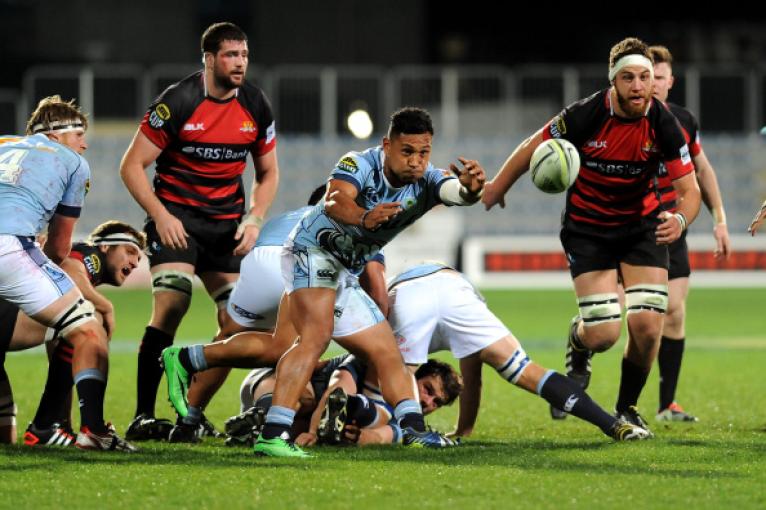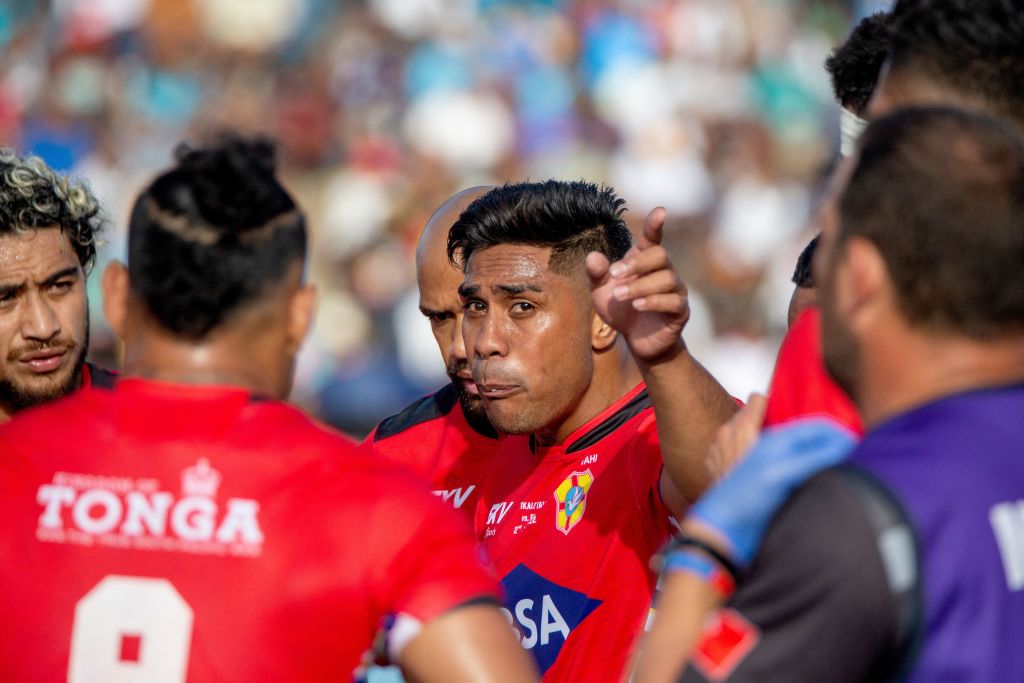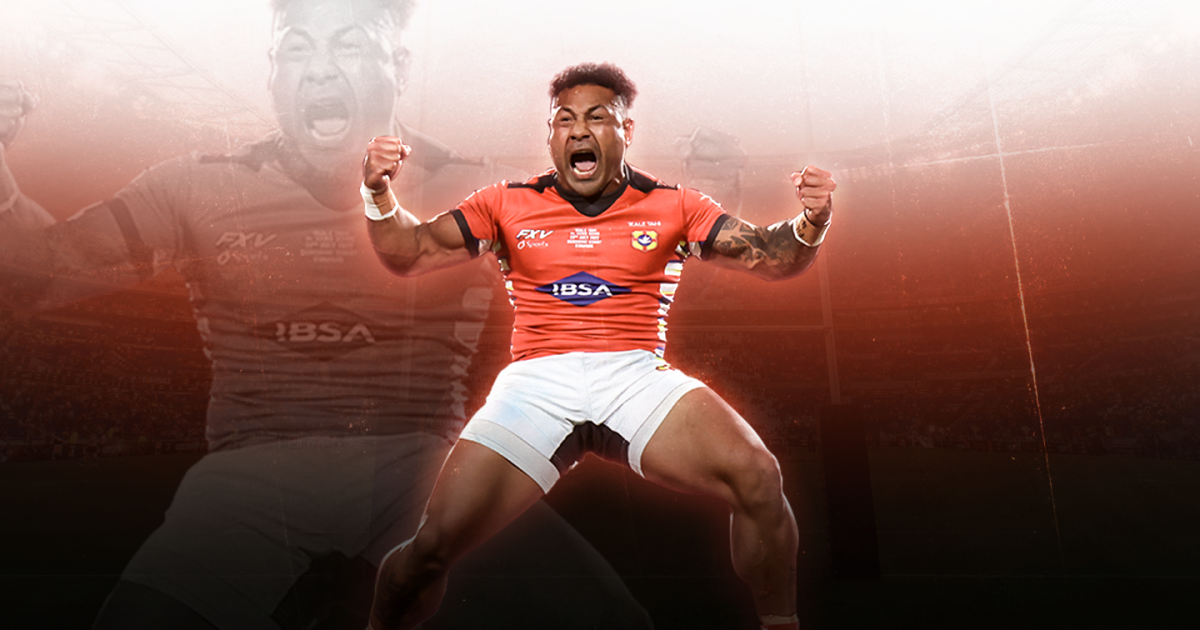Sonatane Takulua: 'I didn't want to work there... I never thought I'd win 50 caps'

As he sat inside the Hanazono Stadium changing room pulling Tonga’s red socks over reputedly the biggest calf muscles in rugby for the 50th time, Sonatane Takulua was grateful to be where he was, on the verge of becoming the ‘Ikale Tahi’s first player to win 50 caps.
It had taken the nuggety scrum-half nine years to get there, from his debut in an 18-18 draw against Samoa in 2014, to a 21-16 defeat in Japan last month. In reality, his journey started much sooner. Disillusioned by a humdrum job in a meat processing plant, Takulua decided it was time to give professional rugby a proper go.
But if you’re picturing Takulua doing a Rocky Balboa and punching dead animal carcasses to get in shape, think again. The hard work of turning himself into a player fit to grace the club colours of Newcastle, Toulon and, currently, Agen, took place an hour’s drive away from his family home in Dargaville, in the Northland region of New Zealand.
“We moved to New Zealand (from Tonga) in 2003 and that’s where my journey started, when I was 12. I represented Northland U12, U16, U18… all the way up,” he told RugbyPass+.
“I left school early and I started working at a meat works for five to six years, it was pretty physical.
“I met my wife, got married, and had kids. That’s when I started thinking to myself, I want to make a living out of rugby. I didn’t want to keep working there for the rest of my life so I moved club, to Mid Northern.
“It was more than an hour’s drive away (on the other side of north island) and my dad would drive me there and back after he’d been working all day.
“Wherever I needed to go, no matter how far it was, he would push me to go to training even though I was tired. My brothers and sisters, we would all jump in the van and go to training and then come back late at night.”

Before emigrating to New Zealand, Takulua’s passion for rugby was based purely on skiving from jobs at the Tupou College, the methodist boys’ school he attended in Toloa, not a love of the game.
At no point did anyone, especially himself, expect Takulua to follow in the footsteps of the college’s most famous former son, Wallaby great Willie Ofahengaue, and make a name for himself in rugby.
“I didn’t really play rugby in Tonga, I used to play soccer. It was my elder brother Taufa who was going to be wearing my shoes, he was the rugby person but he had injuries and hung around with the wrong mates at the time,” he said.
“But when I went to Tupou College I trialled for the U11s rugby team. I had no idea what to do what to do with a rugby ball, all I knew was throwing it about in the village, so I didn’t get picked.
“I didn’t mind because I just used to go to practice to get away from doing jobs after school. I was in a boarding school and we’d have to work for the teachers.”
We got nothing whilst we were there, or for the qualifiers. But I didn’t go there and worry about money.
The move to Mid Northern paid off, but only in terms of progressing his rugby career.
“I got picked for Northland and then Tonga Sevens. In 2013, I went to the Sevens World Cup in Russia,” Takulua explained.
“We got nothing whilst we were there, or for the qualifiers. But I didn’t go there and worry about money, I was just keen to represent my country and do my best.
“My wife (Terrianne) sacrificed a lot. She had to work as well as look after our two boys, who are now 14 and 12.
“My thinking then was that the next time I pull on the Tongan jersey it will be for ‘Ikale Tahi. In 2014, I was lucky enough to go on tour and do that.”
Takulua came off the bench as a replacement for Samisoni Fisilau in the 48th minute of the Pacific Nations Cup tie, playing in the same team as Nili Latu, the man whose caps record he would overtake.
“I remember it was close, I think there were 30 seconds to go and there was a penalty to us. Our 10 (Fangatapu Apikotoa) was a great kicker and he nailed a kick from 40m, from the side and we drew.”

Takulua and Latu would become firm friends and team-mates for several years, not only with Tonga but also at Newcastle, after the 2015 Rugby World Cup.
The move to northeast England proved to be another important step forward in his playing career, and a cultural education. Takulua says he learnt a lot in the five-and-half years he had there, and not just in rugby terms.
“The accent was pretty hard to understand at first and the weather and that was certainly different – you’d get all four seasons in one day,” he recalled.
“My kids picked up the accent really easily as they were at school and me and my wife would listen to them talking to their friends and find it funny to hear them talk Geordie.
“I think I learnt a lot there. It helped my rugby.
“Playing at St James’ Park and beating Sale Sharks was one of my highlights. One year we made the Premiership semi-finals and lost to Exeter, a great team.”
The quicker we get used to playing with each other I think we will give other teams a good game and I am sure we will get some good results.
On the face of it, moving to Toulon from Newcastle was a major step up. But the foreign player quota rules in France and the presence of Baptiste Serin in the squad limited the amount of time Takulua spent in the number nine journey.
Other than that, life on the Mediterranean coast suited the family and the Takuluas are still based in the rugby-mad southwest corner of the country, in Agen.
Very soon, the world’s best teams will descend on that region, as the World Cup begins. This will be Takulua’s third global showpiece.
Tonga have been drawn in pool B with three-time champions South Africa, the world’s number one team Ireland, a resurgent Scotland and Romania.
Picking up more than one win would be a shock but the ’Ikale Tahi sprung one of the biggest surprises in World Cup history by defeating France in 2011.
The current squad is also boosted by recent changes to the eligibility laws, allowing Toutai Kefu to select former All Blacks Salesi (Charles) Piutau, Malakai Fekitoa and George Moala plus Wallaby outcast Israel Folau, while enormous prop Ben Tameifuna has also nailed his colours to the Tongan mast.
How well they integrate those players will be key to their chances of success, admits Takulua.
“I think in my time with ’Ikale Tahi at World Cups in the past, we’ve always been in the ‘death pool’ but that doesn’t stop us. The quicker we get used to playing with each other I think we will give other teams a good game and I am sure we will get some good results.
“The big names bring in a lot of experience. I watch them and I learn from them because of the experience they have of playing for Tier One teams. I ask them how can I, and how can we, do better, and they always speak up and offer their help.

“If things aren’t going well on the field, their experience helps to keep the younger players calm and to just believe in ourselves and our systems that we can do a job.
“It’s going to be good World Cup for the Pacific teams with the rules changing.”
When Latu retired from Test rugby in 2017, he was just two caps shy of reaching 50. Even back then, that would have been a long time coming.
All three main Pacific Island nations started playing international rugby in 1924 – with Tonga having roughly an equal share of the 900-plus Tests they have played between them – but it has taken the ’Ikale Tahi two decades longer than Fiji and Samoa to boast their first half-centurion.
It was back in 2000 when Samoa handed To’o Vaega his 50th cap, while Nicky Little was the first to hit the milestone for Fiji in 2003. Both countries have had a number of other players join them since. Finally, though, Tonga have their first.
“It is a big honour, I never thought I would reach this milestone,” Takulua said, a hint of emotion evident in his voice. “I am grateful to reach this many Tests for ’Ikale Tahi
“(In 2014) I was just happy to play for Tonga and to pull on the jersey. Year after year I put my hand up and I have just been lucky that I have represented my country for this long.”










































































